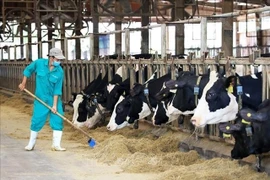Hanoi (VNS/VNA) - As Vietnam grows faster on the global economic stage, the need for sustainability is becoming more urgent. ESG (Environmental, Social and Governance) principles are now seen not just as international standards but as essential strategies.
“ESG is not a trend – it is an essential strategy,” said Sam Hanna, former CEO & Vice President of Strategy at ASEAN Shell Global Lubricants and current Director of the EMBA programme at the Asian Institute of Technology (AIT).
Speaking at the forum on digital transformation and ESG as the key to global economic integration hosted by Dan Tri newspaper and VietinBank on Tuesday, Hanna emphasised that Vietnam’s dynamic momentum, marked by strong GDP growth and a substantial rise in foreign direct investment, has positioned the country at a crucial turning point.
The real challenge lies in making sure this growth is sustainable, inclusive and resilient.
“Vietnam is at a crucial juncture, where it must balance two urgent goals — to grow rapidly, but also sustainably,” he said.
Hanna stressed that ESG must move beyond Corporate Social Responsibility (CSR).
“CSR is voluntary. ESG is a far more structured framework where companies need to report to keep everybody honest,” he explained.
In sectors like sustainable timber, electric vehicles and clean energy, green finance initiatives in Vietnam have already attracted over 120 million USD in international investment. Still, the adoption of ESG principles remains patchy.
80% of Vietnamese companies have either committed to or are planning to adopt ESG standards, but 34% have no ESG programmes in place. Only 15% of Vietnamese firms publish full ESG reports, and over 70% disclose little or no ESG data, Hanna noted.
This gap between intention and implementation is even more concerning in small and medium-sized enterprises (SMEs).
“Over time, constraints have changed. In the past, we didn’t talk about environment or social responsibility, but now these are key challenges SMEs must address to stay competitive,” said Dr Luong Thai Bao, head of the Department of International Finance at the National Economics University in Hanoi.
ESG and digital transformation can be both goals and tools, depending on the industry and size of the business. Companies facing global competition are more likely to invest in ESG, while many domestic market-focused firms are not yet ready due to high costs and limited support.
According to Bao, currently about 15 banks in Vietnam have internal green credit strategies. In theory, green loans should offer better interest rates, but regulations and risk-sharing mechanisms are still unclear.
“Still, banks need to diversify services, including green finance. Those further along in digital transformation already show more balanced income beyond just lending,” Bao said.
Vietnam has introduced ambitious policies, including Decree 06/2022/NĐ-CP, which mandates emissions reporting for many enterprises. However, both experts argue that the real bottleneck is not policy, but people.
“No matter how good your strategy or technology is, it will fail without capable people,” said AIT Vietnam Director Phung Van Dong. He said he believes that human capital is the single most critical pillar of Vietnam’s green and digital transition.
“ESG requires interdisciplinary skills – people who understand not only finance or technology, but how these interact with environmental and social metrics. And we don’t have enough of them,” he warned.
The numbers are stark. Vietnam will need 700,000 ICT professionals by the end of the year, and only about 550,000 are currently in the workforce. Even among university graduates, just 30% are considered job-ready. In ESG-specific roles, the gap is wider.
VietinBank offers a promising case study. As one of the country’s pioneers in ESG financing, the bank has disbursed around 1.8 billion USD in green loans and launched a support package worth 5 trillion VND (192 million USD) for businesses transitioning toward sustainability. But these successes also bring mounting pressure.
“Businesses need ESG-literate personnel to access and implement green financing – and many simply don’t have that capacity yet,” said Dong.
To address this, he emphasises the need for collaboration between multiple stakeholders including educational organisations, companies, banks and government agencies to deliver flexible training programmes, particularly in underdeveloped provinces and among women-led SMEs.
As Vietnam moves forward, ESG, innovation and digital transformation will change the way businesses grow and how they are evaluated. This journey can’t rely on policy alone. It needs strong leadership, the right technology and, most importantly, skilled people who are ready to build a greener, more competitive economy.
“Vietnam has talent, momentum and vision to lead in ESG, not to follow,” said Hanna./.
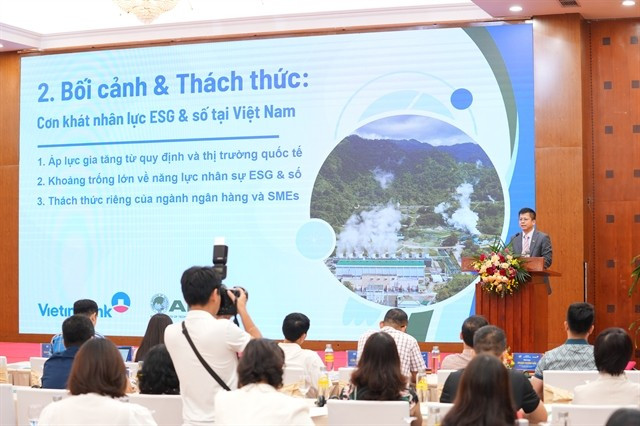
See more

Vietnam’s property prices to remain stable next year
In 2026, the outlook is expected to improve further, and analysts do not foresee a return of widespread price surges. Dr Can Van Luc, Chief Economist at BIDV, said the market is moving from a phase of “technical recovery” to “structural stabilisation”.
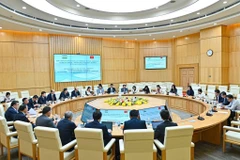
Vietnam, Uzbekistan boost cooperation in trade, automobile industry and logistics
Delegates noted that Vietnam and Uzbekistan still hold considerable potential for cooperation in agriculture, agro-processing, light industry, automobile manufacturing, transport, logistics, construction, tourism and culture.
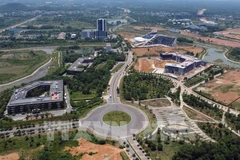
Hanoi seeks to boost investment, business in hi-tech parks, IZs
In 2025, Hanoi’s high-tech parks and IZs posted strong performance, with estimated revenue of 12.14 billion USD, contributing about 19.12% to the city’s GRDP, while budget contributions reached 450 million USD and export turnover amounted to 7.42 billion USD.

Tax authority budget revenue exceeds 2 quadrillion VND for the first time
It is estimated that by December 31, revenue managed by tax authorities will surpass 2.24 quadrillion VND, exceeding the target assigned by the National Assembly by 30.1% and rising by 27.6% compared to 2024.

Vietnam witnesses spectacular breakthrough amidst challenges: Professor
According to Professor Vu Minh Khuong of the Lee Kuan Yew School of Public Policy in Singapore, the 8% growth rate represents Vietnam's extraordinary effort and has created a strong impression among international investors and economic partners.

The aviation ecosystem game: Can Sun Group Win?
These are among the most notable assessments made by the Centre for Aviation (CAPA) – the world’s leading aviation data and analytics platform – when evaluating the development prospects of Phu Quoc in the coming years.

Green consumption on the rise, int’l tourists increasingly favour Vietnamese products
Green consumption is no longer a niche trend but a strong movement encouraging businesses to transform production practices and rethink their market approaches.

Germany’s EVIPA ratification marks strong vote of confidence in Vietnam
Germany’s decision is widely seen as a clear affirmation of growing confidence in Vietnam’s investment climate, governance capacity and long-term development orientation.

Firms advised to adapt to new EU standards to sustain exports
The move places stronger demands on Vietnamese exporters to ensure product quality and strict compliance if they wish to maintain stable market access.

New decree sets roadmap for nuclear infrastructure and workforce development
The decree also covers simulation systems and databases for radiation safety, nuclear safety and nuclear security; specialised computational software for safety assessment; monitoring and command-and-control systems for responding to radiation and nuclear incidents; as well as design documentation, technical manuals, prototype products and other related facilities and equipment.

Growing e-commerce market sees tougher fight against counterfeits
The local e-commerce market has surpassed 30 billion USD this year, recording growth of 25% and accounting for two-thirds of the value of the digital economy. However, this rapid growth has also brought about serious consequences, particularly the widespread proliferation of counterfeit and imitation goods and trade fraud.

Reference exchange rate stays stable on December 24
The State Bank of Vietnam set the daily reference exchange rate at 25,146 VND/USD on December 24, unchanged from the previous day.
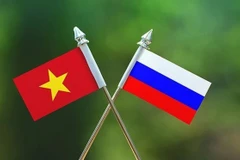
Vietnam, Russia explore cooperation opportunities in digital era
A seminar aimed at exploring cooperation opportunities between Vietnam and Russia in the digital era was held on December 23 at the Hanoi–Moscow multifunctional commercial centre in Moscow.

Patriotic emulation fuels Vietnam’s aspiration through strategic national projects
The 500 kV Circuit 3 transmission line linking Quang Trach (Quang Binh) and Pho Noi (Hung Yen) has marked a remarkable milestone for Vietnam’s electricity sector, as one of the country’s most complex energy projects was completed in just six months instead of the usual three to four years.
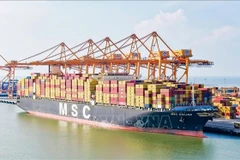
Vietnam eyes faster growth in 2026 on reforms
Vietnam's economy is on track to end 2025 on a high note, having maintained macroeconomic stability, supported a conducive business climate and sustained market confidence.
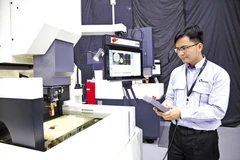
Southern key economic region expects strong FDI influx
The recent mergers of provinces and cities have opened up new development space and provided a strong boost to FDI attraction across the southern key economic region.
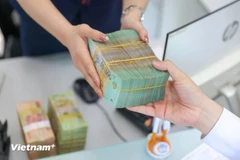
Banking sector anchors macroeconomic stability, setting stage for new growth cycle
Throughout 2025, the State Bank of Vietnam (SBV) has reaffirmed its role as the central regulatory authority in managing monetary policy, stabilising the financial market, and maintaining macroeconomic balance. Closely monitoring international and domestic economic trends, the SBV steered the monetary policy proactively while closely coordinating with the fiscal policy to achieve the dual objective of controlling inflation and supporting growth.

Vietnam – A rising star in Asia: Indian professor
Vietnam’s projected GDP growth of around 8% in 2025 shows that its economy is on an impressive growth trajectory, driven by multiple reinforcing engines, said Professor Reena Marwah from the University of Delhi, and Secretary-General of the Association of Asia Scholars (AAS).

China to allow import of Vietnamese fresh jackfruits from June 1, 2026
To ensure smooth customs clearance, all orchards and packing facilities participating in exports must be registered and approved by competent authorities of both countries. The list of approved entities granted export codes will be published and regularly updated on the GACC website.

Reference exchange revised down slightly on December 23
With the current trading band of +/- 5%, the ceiling rate applicable for commercial banks during the day is 26,403 VND/USD, and the floor rate 23,889 VND/USD.

